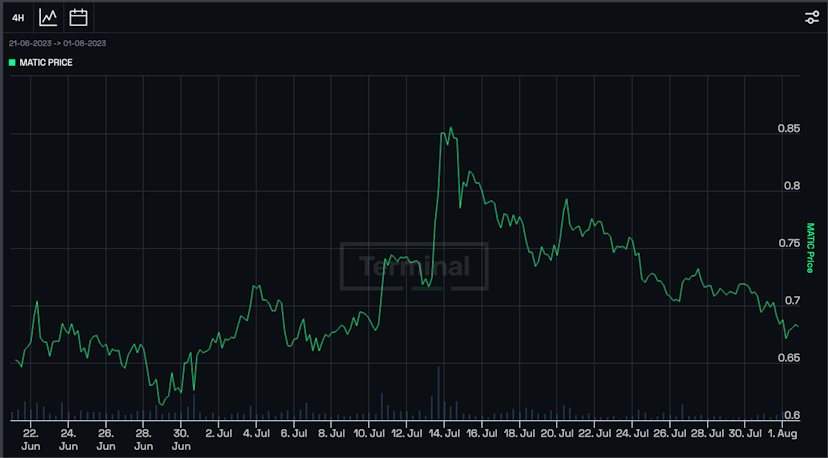Polygon Proposes Revamped Governance Model For 2.0 Roadmap
Polygon Labs plans to explore community governance and quadratic voting
By: Samuel Haig • Loading...
DeFi
Polygon Labs, a leading Ethereum scaling team, has proposed a new governance strategy as part of its Polygon 2.0 overhaul.
On July 19, Polygon Labs detailed its plans for a new governance system, outlining its community treasury, system smart contracts, and core protocol as three core “pillars” of governance the project will prioritize moving forward.
“Once Polygon 2.0 vision becomes reality, it will continue requiring community involvement and governance for years to come,” Polygon said in a blog post. “Every aspect of Polygon 2.0 is an open discussion. The community has full control over the Polygon network and will have the final say on all the proposals that have been shared so far.”
Polygon’s MATIC token is up 7% in the past 24 hours.

Polygon 2.0
The news is the final of several announcements from Polygon Labs outlining its vision for the Polygon 2.0 ecosystem. Last week, Polygon revealed plans to replace MATIC with a new token called POL last week.
The 2.0 roadmap plans to unify the Polygon PoS Chain and Polygon ZkEVM, before converging each of Polygon’s scaling solutions into a symbiotic multichain ecosystem powered by zero-knowledge (ZK) proofs. The PoS sidechain is Polygon’s oldest and largest network, boasting a nearly $1B market cap six years after deployment. However, the PoS Chain’s scalability now lags behind Polygon’s newer Layer 2 networks ZkEVM, Nightfall, and its forthcoming STARK-based solution, Miden.
Polygon is not alone in its multichain refocus, with rival Layer 2 teams Optimism and zkSync recently announcing plans for their own multi-network ecosystems based on their technology.
Decentralizing Governance
The plan recommends extending the Polygon Improvement Process (PIP) currently used for the Polygon PoS Sidechain to “eventually” cover Polygon’s entire stack, and to establish a community-governed “Ecosystem Council.”
The PIP process is inspired by Ethereum’s EIPs, allowing community members to propose upgrades to Polygon. Users post proposals to a community forum for discussion, with proposals elevating to a formal on-chain Snapshot vote after attracting popular support.
Polygon’s PoS chain currently uses a designated Proof of Stake governance mechanism, where tokenholders can designate assets to governance delegates who vote on their behalf.
Ecosystem Council
Polygon Labs said it will soon publish a proposal to launch its Ecosystem Council, a community-governed entity responsible for upgrading system smart contracts. The Ecosystem Council will provide an additional layer of governance alongside the PIP process to oversee Polygon’s smart contracts.
“A tailor-made governance framework would accompany the Ecosystem Council, enabling secure, scalable, and explicit decision-making for this pillar,” Polygon Labs said. “On a high-level, a model safeguarded by community veto and elections, built on advanced token holder governance, may offer the best balance of security and efficiency.”
A “Community Treasury Board” will initially govern the Ecosystem Council. Once a robust community has emerged around the council, it will begin transitioning to community-driven governance. Polygon Labs suggested on-chain reputation and quadratic voting could be incorporated into Ecosystem Council governance.
Polygon Labs will also launch an Ecosystem Council Transparency dashboard, an open-source tool for monitoring proposals and upgrades, in the future.
Advertisement
Get the best of The Defiant directly in your inbox 💌
Know what matters in Web3 with The Defiant Daily newsletter, every weekday
90k+ investors informed every day. Unsubscribe anytime.